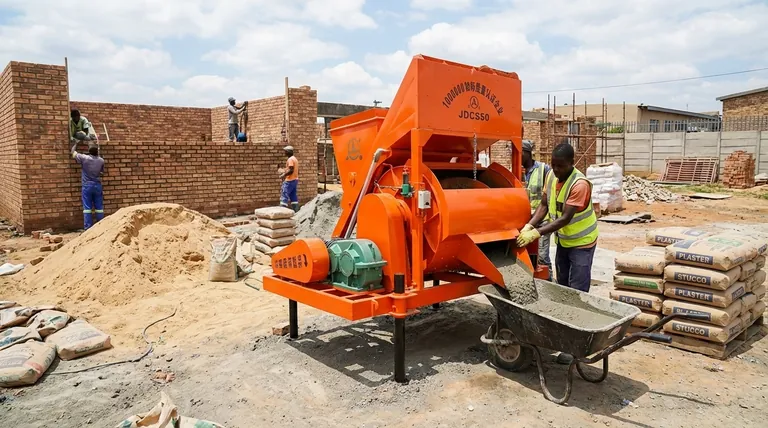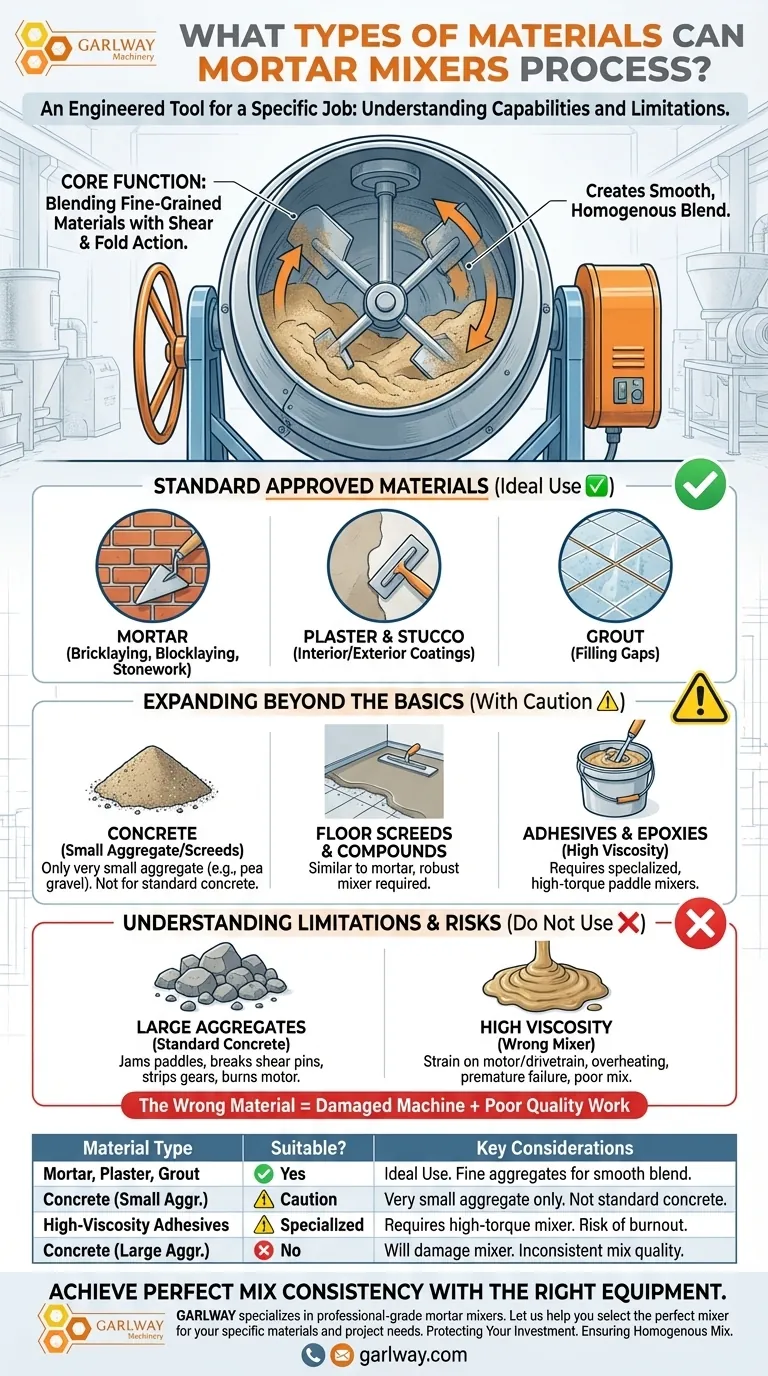At its core, a mortar mixer is an engineered tool for a specific job. While its primary purpose is to blend fine-grained materials like mortar, plaster, and grout, its capabilities can extend to similar substances such as concrete screeds and some adhesives, provided the mixer is the appropriate model for the task. The defining factor is always the material's aggregate size and viscosity.
The crucial takeaway is that a mortar mixer excels at creating a smooth, homogenous blend of materials containing sand or other fine aggregates. Using it for materials with large, heavy aggregates or for high-viscosity compounds risks damaging the mixer and will almost certainly result in a poor-quality mix.

The Core Function: Blending Fine-Grained Materials
A mortar mixer is not simply a generic mixing machine. Its design—from the motor's torque to the shape of the paddles—is optimized for a specific type of action that is fundamentally different from that of a standard concrete mixer.
Why Specialization Matters
The paddles in a mortar mixer are designed to shear and fold the material. This action is perfect for forcing water to evenly coat the fine particles of sand, cement, and lime, creating a consistent, plastic, and workable paste.
Standard Approved Materials
These mixers are purpose-built for the core materials used in masonry and finishing work.
- Mortar: For bricklaying, blocklaying, and stonework.
- Plaster & Stucco: For interior and exterior wall coatings.
- Grout: For filling gaps between tiles or in masonry.
The Goal is Homogeneity
For these applications, a completely homogenous blend is non-negotiable. Any clumps or dry pockets will compromise the structural integrity and finish of the final work. The mortar mixer's design ensures this critical consistency is achieved efficiently.
Expanding Beyond the Basics
While specialized, the capabilities of some mortar mixers can extend to materials with similar properties. However, this is where careful consideration becomes paramount.
A Note on Concrete
A mortar mixer can process some forms of concrete, but only if the aggregate is very small (like pea gravel) or if it's a sand-only mix. It is not a substitute for a rotating drum concrete mixer, which is designed to tumble and mix heavy aggregate.
Screeds and Floor Compounds
Floor screeds are typically made of cement, sand, and water, making them very similar in composition to mortar. A robust mortar mixer is perfectly capable of handling this material to create a smooth base for flooring.
Adhesives and Epoxies
Some paddle mixers, which fall under the general category of "mortar mixers," are specifically designed for higher viscosity materials like floor glue, thin-set, or epoxies. These often have more powerful motors and differently shaped paddles to handle the increased resistance.
Understanding the Limitations and Risks
Using the wrong material in a standard mortar mixer is the fastest way to destroy the machine and ruin your project. Understanding its limitations is key to avoiding costly mistakes.
The Danger of Large Aggregates
The primary limitation is aggregate size. Large, heavy stones found in standard concrete will jam the stationary paddles, potentially breaking the shear pins, stripping the gears, or burning out the motor. Unlike a tumbling drum mixer, a mortar mixer cannot simply lift and drop heavy rock.
The Problem with High Viscosity
Thick, sticky materials place immense strain on the motor and drivetrain. A standard mixer's motor is not designed for the sustained torque required to mix these compounds, leading to overheating and premature failure.
Impact on Mix Quality
Even if the mixer survives, the final product will be substandard. The shearing action is ineffective on large aggregates, leading to an inconsistent mix where cement paste hasn't properly coated the stones. This creates weak points and guarantees a poor outcome.
Making the Right Choice for Your Material
To ensure safety, efficiency, and a high-quality result, you must match the material to the right equipment.
- If your primary focus is masonry or plastering: A standard mortar mixer is the ideal tool for achieving perfect consistency with mortar, grout, and stucco.
- If your primary focus is concrete with heavy aggregate: You must use a rotating drum-style cement mixer designed to handle the weight and size of the rock.
- If your primary focus is adhesives or epoxies: You need a specialized, high-torque paddle mixer built specifically for high-viscosity materials.
Ultimately, respecting the engineering of your tools is the key to protecting your investment and achieving a professional-grade result.
Summary Table:
| Material Type | Suitable for Mortar Mixer? | Key Considerations |
|---|---|---|
| Mortar, Plaster, Grout | ✅ Yes | Ideal Use. Designed for fine aggregates to create a smooth, homogenous blend. |
| Concrete (Small Aggregate/Screeds) | ⚠️ With Caution | Only suitable for mixes with very small aggregate (e.g., pea gravel). Not for standard concrete. |
| High-Viscosity Adhesives/Epoxies | ⚠️ Specialized Models Only | Requires a high-torque paddle mixer. Standard models risk motor burnout. |
| Concrete (Large Aggregate) | ❌ No | Will damage the mixer and result in a poor-quality, inconsistent mix. |
Achieve Perfect Mix Consistency with the Right Equipment
Choosing the correct mixer is critical for the quality and efficiency of your project. GARLWAY specializes in construction machinery, offering durable and powerful mortar mixers designed for construction companies and contractors who demand professional-grade results.
Let us help you select the perfect mixer for your specific materials and project needs. Our experts can guide you to the right solution, ensuring you get a homogenous mix every time while protecting your investment.
Contact GARLWAY today for a consultation and discover the right machinery for your job!
Visual Guide

Related Products
- JDC350 Small Cement Concrete Mortar Mixer
- Auto Concrete Cement Mixer Machine New
- Commercial Construction Mixer Machine for Soil Cement Mixing Concrete
- Hydraulic Concrete Mixer Machine Cement Mixing Equipment for Mixture Concrete
- Construction Products Concrete Plant Machine Mixing Concrete Mixer
People Also Ask
- What are the five main advantages of using a volumetric mixer over a drum mixer? Achieve Unmatched On-Site Concrete Control
- What are the characteristics of a non-tilting drum mixer? Discover Simplicity and Reliability
- What features enable a self-loading concrete mixer to handle challenging terrain? Unlock All-Terrain Concrete Delivery
- How do self-loading concrete mixers improve concrete production? Boost Efficiency & Cut Costs On-Site
- What is the procedure for adding cement to a concrete mixer truck? Ensure a Perfect Mix Every Time
- What are the requirements for lubricants used in concrete mixers? Ensure Maximum Equipment Lifespan and Uptime
- When were modern volumetric mixers first developed? A 1960s Revolution in Concrete
- What are the operational benefits of the flat mouth cement mixer truck? Unlock On-Site Concrete Production Efficiency



















